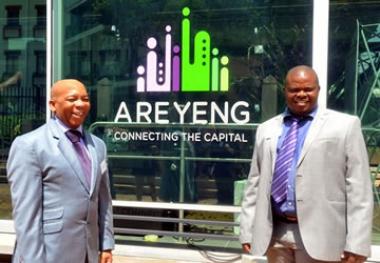Tshwane signs agreement to implement A re Yeng bus system
 The Executive Mayor of the City of Tshwane, Councillor, Kgosientso Ramokgopa, presided over the unveiling of the Tshwane Rapid Transit’s first bus terminal in Hatfield on 19 March 2013.
The Executive Mayor of the City of Tshwane, Councillor, Kgosientso Ramokgopa, presided over the unveiling of the Tshwane Rapid Transit’s first bus terminal in Hatfield on 19 March 2013.
The City of Tshwane has signed a Memorandum of Agreement (MoA) with representatives of the taxi industry to ensure the peaceful implementation of the Tshwane Rapid Transit (TRT) A Re Yeng, (Let’s Go) bus system.
The City signed the agreement with representatives of the Greater Tshwane Taxi Council (GTRTC) and the Transport Operators Peace Initiators Conglomerate Associations (TOPICA) in Pretoria on Wednesday.
Member of the Mayoral committee (MMC) responsible for Transport, George Matjila, who described the signing of the MoA as a milestone said: “Now that there is an agreement, we are not going to operate outside what we have agreed upon. For us this is a significant achievement.
“Unlike in other cities, we did not get to this point on the basis of violence, pressure or intimidation from the taxi industry, but through a peaceful process driven by the spirit of negotiating in good faith.”
Matjila said part of the memorandum of agreement is that the taxi industry in Tshwane expressed a desire not to repeat what transpired in the City of Johannesburg during the run up to the roll out of their Rea Vaya system.
“We are aware that A Re Yeng on its own will not be the entire solution to our public transport challenges, yet we acknowledge that once it is integrated with existing transport options, it will result in greater flexibility, convenience and affordability,” he said.
Chairperson of the GTRTC, Abner Tsebe, said the association embraced A Re Yeng.
“In Tshwane, we will support change. We don’t need violence and we don’t need division. To us, this is a good move, a milestone indeed and we are happy about it.”
Chairperson of TOPICA, Piet Mahlangu, said: “We don’t want to be the end user, we don’t want to be the consumer, we want to own the TRT. As it was said by the mayor, the TRT is going to be owned by the taxi industry. Therefore, we are happy about the signing of the agreement. We think that this is the beginning of a long journey.
“Where we will encounter challenges, we will sit down and resolve those with the view of moving forward and it is our view that this is going to be a smooth process until to the end.”
How TRT will work
The first phase of the project is the inception phase, running from the Central Business District (CBD) to Hatfield route, where operations will commence in April 2014. The next phase of the system runs from Rainbow junction to Menlyn via Pretoria North, CBD and Hatfield to the CBD. The system will commence operations in October 2015. The entire system is set for operation by 2016 or 2017.
According to Matjila, Mahlangu and Tsebe, there should be no loss of employment as the taxi industry won’t be worse off as a result of the implementation of the TRT. There will be additional job opportunities for customer service staff, fare collection staff, security workers and maintenance staff personnel. The TRT will have a positive impact for a number of people working in the transport industry.
The TRT will operate on a low floors model which will improve accessibility, operate along dedicated lanes trunk routes, with stations located in the centre of the road.
Feeder services will allow passengers to enter and leave the trunk routes at certain points and complimentary buses will extend the TRT’s reach far beyond the main trunk routes. The TRT will be operated from a state-of-the-art control centre to enhance security and provide real-time information to TRP passengers.
Special needs passengers will be able to embark and disembark all TRT buses with ease. A Re Yeng will be fully integrated with existing transport options in order to provide an optimal service to commuters.
It is envisaged that buses will run every three to five minutes during peak hours on the main trunk routes and every 15 minutes on feeder routes.
The bus service will operate Monday to Saturday from 5am to 8:30 pm and Sunday and Public Holidays from 7am to 7pm.
A re Yeng will use modern technology and infrastructure, including efficient buses, dedicated bus lanes and passenger smart cards to achieve the objectives. The TRT will provide an efficient, reliable and frequent public transport service, reducing travel times and providing easy access to places of work, social retail and tourist destinations.
It will also provide a fully integrated transport system for all Tshwane residents, as well as reduce traffic congestions and fatal accidents on the roads. The bus system will make allowance for non-motorists transport modes such as wheelchairs, cycling and pedestrians, while improving access for people with disabilities.
Last year, Tshwane Mayor Kgosientso Ramokgopa officially launched construction at the first TRT station in Hatfield. A company that will operate approximately 154 buses, which are still to be procured for the system, will sign a 12-year contract with the City.













